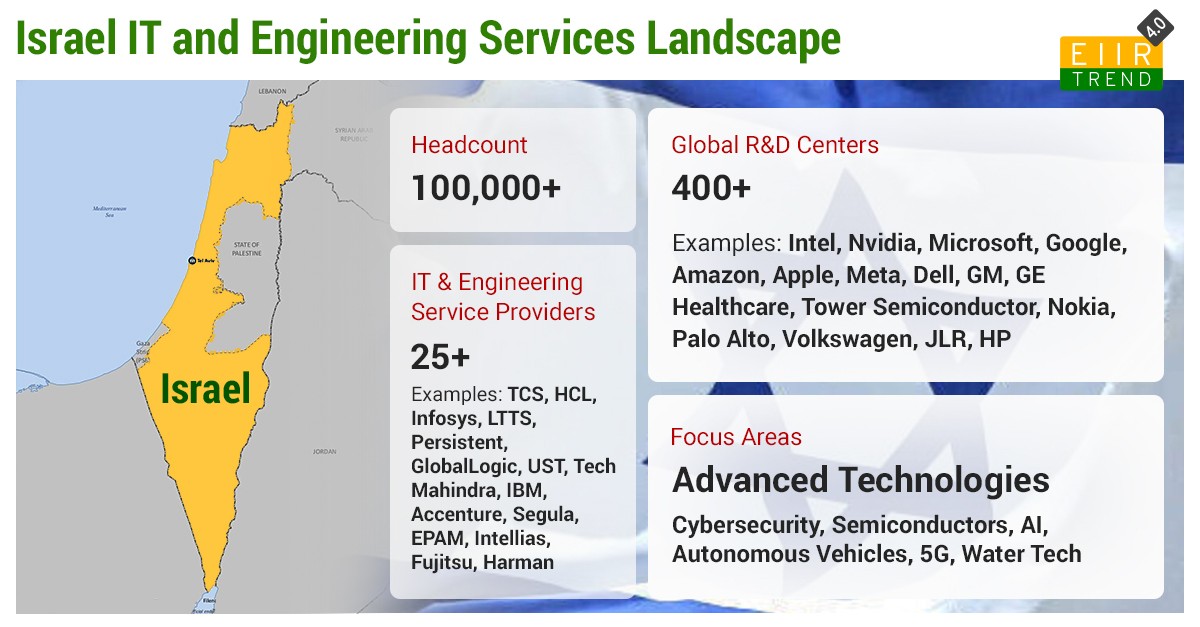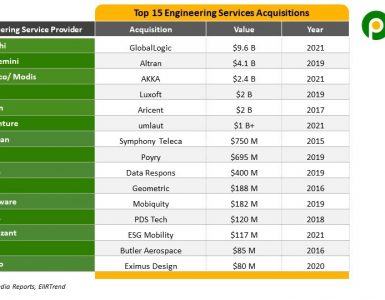What might be the impact of the situation in Israel on IT and engineering services? The situation is changing daily, but based on current visibility, there could be disruption in some programs and delivery in the short term and changes in priorities in the medium term.
Israel IT and Engineering Services Landscape
Israel boasts a dynamic IT and engineering services ecosystem that includes both service providers and R&D centers. Here are some highlights:
-
Headcount: Over 100,000 professionals in Israel work for global R&D centers and IT service providers.
-
Global R&D Centers: There are more than 400 global R&D centers in Israel belonging to leading global corporations. Almost every recognizable name across industries has established a presence here to tap into Israel's engineering expertise. Notable examples include Intel, Nvidia, Microsoft, Google, Amazon, Apple, Meta, Dell, GM, GE Healthcare, Tower Semiconductor, Nokia, Palo Alto, Volkswagen, JLR, and HP.
-
IT and Engineering Service Providers: Over 25 IT and engineering service providers operate in Israel. This includes global service providers, Indian service providers, and other regional service providers. A few examples are TCS, HCL, Infosys, LTTS, Persistent, GlobalLogic, UST, Tech Mahindra, IBM, Accenture, Segula, EPAM, Intellias, Fujitsu, and Harman.
-
Specialization: While Israel is renowned for its advancements in cybersecurity, it has also built robust expertise in other cutting-edge technologies. This includes fields like semiconductors, 5G, autonomous vehicles, and water tech, among others.

Strategic Importance of Israel in IT and Engineering Services
The strategic importance of Israel in the realm of IT and engineering services cannot be understated. Even though Israel's market in this sector is smaller compared to other regions, such as India, where the IT sector employs over 5.4 million, it holds considerable significance for both enterprises and service providers.
-
·Enterprises. Many prominent global corporations integrate Israel into their cybersecurity strategies, like Microsoft's Israel R&D Center, which plays a role in developing security for ChatGPT. Furthermore, these corporations frequently collaborate with Israeli startups.
-
Service Providers. For IT and engineering service providers, Israel's importance manifests in four distinct areas. Firstly, there's the domestic market within Israel that encompasses the government, local banks, and telecoms, even though it's relatively small in scale. Secondly, providers have the opportunity to collaborate with the global R&D divisions of major corporations present in Israel. The third aspect is the rich pool of talent Israel offers, especially in cybersecurity and other advanced technological domains. Lastly, there's the potential to partner with Israeli startups to foster innovations, whether independently or in collaboration with larger enterprises. A prime example of this is TCS's alliance with Jaguar Land Rover to initiate its Open Innovation Program in Israel, aiming to co-create mobility solutions alongside Israeli startups.
What could be the impact?
-
Security of Employees. The security of employees is currently a primary concern for both service providers and enterprises. It's essential that employees remain safe and have the flexibility to work remotely as necessary.
-
Military Duty. If tensions escalate, tech company staff members might be called upon for military duty. Israel has indicated its readiness to summon up to 300,000 reservists, many of whom could be from the IT and engineering services sector.
-
Work Transfer to Alternate Locations: If disruptions continue and regular operations are hindered, some vital and time-sensitive projects might be relocated. Given that many enterprises and service providers operate globally, based on situational demands and skillset necessities, tasks might be shifted to other R&D and delivery centers, particularly in the US, India, and Europe.
-
Impact in MENA Region. If the situation drags on and countries in the Middle East North Africa (MENA) region become involved, it could significantly impact the global delivery model for both enterprises and service providers. This might prompt them to reconsider their investment strategies in the region, affecting both demand and supply dynamics.
Bottom Line: The world has been full of challenges, uncertainty, and disruption for IT and engineering service providers in recent years, from the pandemic to the Ukraine conflict and now the situation in Israel. Although we overcome each challenge, the world doesn’t remain the same. While we hope for a swift resolution, both enterprises and service providers must be ready to adapt to an ever-changing global landscape.






 Pareekh Jain
Founder of Pareekh Consulting & EIIRTrends
Pareekh Jain
Founder of Pareekh Consulting & EIIRTrends
Add comment